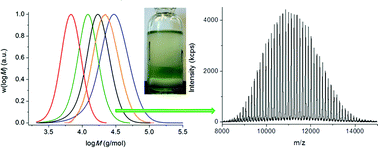Herein, we demonstrate the synthesis of well-defined poly(n-alkyl acrylate)s via copper(0)-mediated radical polymerisation in a self-generating biphasic system. During the polymerisation of n-butyl acrylate in DMSO, the polymer phase separates to yield a polymer-rich layer with very low copper content (ICP-MS analysis: 0.016 wt%). The poly(n-butyl acrylate) has been characterized by a range of techniques, including GPC, NMR and MALDI-TOF, to confirm both the controlled character of the polymerisation and the end group fidelity. Moreover, we have successfully chain extended poly(n-butyl acrylate) in this biphasic system several times with n-butyl acrylate to high conversion without intermediate purification steps. A range of other alkyl acrylates have been investigated and the control over the polymerisation is lost as the hydrophobicity of the polymer increases due to the increase in alkyl chain length indicating that it is important for the monomer to be soluble in the polar solvent.
You have access to this article
 Please wait while we load your content...
Something went wrong. Try again?
Please wait while we load your content...
Something went wrong. Try again?


 Please wait while we load your content...
Please wait while we load your content...